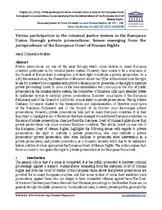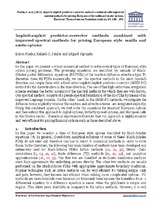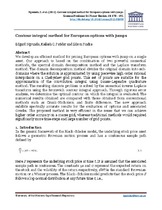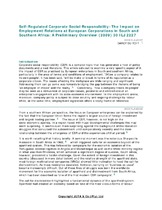Victim participation in the criminal justice system in the European Union through private prosecutions: Issues emerging from the jurisprudence of the European Court of Human Rights
Abstract
Private prosecutions are one of the ways through which crime victims in many European countries participate in the criminal justice system. However, there seems to be a reluctance at the Council of Europe level to strengthen a victim’s right to institute a private prosecution. In a 1985 Recommendation, the Committee of Ministers stated that ‘[t]he victim should have the right to ask for a review by a competent authority of a decision not to prosecute, or the right to institute private proceeding.’ Later in 2000 in the Recommendation Rec (2000)19 on the role of public prosecution in the criminal justice system, the Committee of Ministers calls upon Member States to ‘authorise’ victims to institute private prosecutions. Directive 2012/29/eu of the European Parliament and of the Council of 25 October 2012 is silent on private prosecutions. The dg Justice Guidance Document related to the transposition and implementation of Directive 2012/29/eu of the European Parliament and of the Council of 25 October 2012 discourages private prosecutions. However, private prosecutions take part in many European countries. It is thus important to highlight some of the issues that have emerged from different European countries on the issue of private prosecutions. Case law from the European Court of Human Rights shows that private prosecutions take place in many European countries. This article, based on case law of the European Court of Human Rights, highlights the following issues with regards to private prosecutions: the right to institute a private prosecution; who may institute a private prosecution? private prosecution after state declines to prosecute; state intervention in a private prosecution; and private prosecution as a domestic remedy which has to be exhausted before a victim of crime approaches the European Court of Human Rights. The author argues that there is a need to recognise the right to private prosecution at the European Union level.
Collections
Related items
Showing items related by title, author, creator and subject.
-
Implicit-explicit predictor-corrector methods combined with improved spectral methods for pricing European style vanilla and exotic options
Pindza, Edson; Patidar, Kailash C.; Ngounda, Edgard (Kent State University, 2013)In this paper we present a robust numerical method to solve several types of European style option pricing problems. The governing equations are described by variants of Black-Scholes partial differential equations (BS-PDEs) ... -
Contour integral method for European options with jumps
Ngounda, Edgard; Patidar, Kailash C.; Pindza, Edson (Elsevier, 2013)We develop an efficient method for pricing European options with jump on a single asset. Our approach is based on the combination of two powerful numerical methods, the spectral domain decomposition method and the Laplace ... -
Self-Regulated corporate social responsibility: the impact on employment relations at European corporations in South and Southern Africa: a preliminary overview
Du Toit, Darcy (Juta Law, 2009)Introduction:Corporate social responsibility (CSR) is a complex topic that has generated a host of policy documents and a vast literature. This article sets out to examine a very specific aspect of it: the impact of CSR ...




